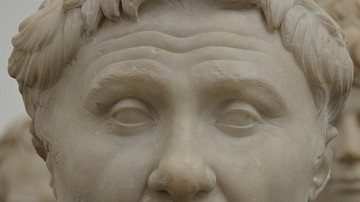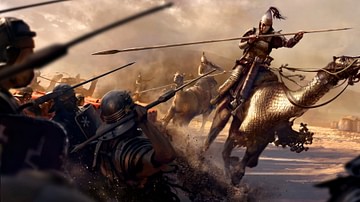
Throughout history - both ancient and modern - those bound in chains have fought to free themselves from their oppressors. As with most civilizations - Assyrian, Greek and even American - slaves in ancient Rome were not considered citizens, but property, providing labor, both skilled and unskilled, to the rest of society. Obviously, slave revolts, whether in Rome or elsewhere, provided a danger to all citizens, and while most of these uprisings were quickly suppressed, one revolt in the first century BCE caused enough concern for the Roman Senate that they eventually called upon two of their greatest generals to crush it. Over a two-year period, this “small” uprising, led by a one-time gladiator, initiated what would become known as the Third Servile War. This man's name was Spartacus.
While little of his early life is known, Spartacus was originally from Thrace, an area northeast of Macedonia, and may have been a Roman soldier. Historian Plutarch described him as cultured and intelligent, “more Greek than Thracian.” How he went from being a soldier to being captured (along with his wife) and made a gladiator is unknown; however, because of his unique physique and strength, he caught the eye of a trainer named Lentulus Batiatus and was sent to a gladiatorial school in Capua, a city south of Rome. Life in a gladiatorial school was both cruel and harsh. So, in 73 BCE, using kitchen knives, he and 78 of his fellow slaves revolted. Upon their escape, they came upon a small caravan of wagons carrying weapons and seized it, fleeing to nearby Mt Vesuvius. Soon, local shepherds, herdsmen and slaves joined him, swelling his small army to over 70,000. To survive they began pillaging throughout central Italy. In his 'Life of Marcus Licinius Crassus', Plutarch wrote of their escape,
Two hundred of these formed a plan to escape, but their plot being discovered, those of them who became aware of it in time to anticipate their master, being seventy-eight, got out of a cook's shop chopping knives and spits, and made their way through the city, and lighting by the way on several wagons that were carrying gladiator's arms to another city, they seized upon them and armed themselves.
Although he had considerable early success, even defeating the armies of two praetors and the governor of Cisalpine Gaul and seizing their weaponry, Spartacus realized that Rome would eventually win and therefore he intended to travel northward to the Alps and home. In 72 BCE he split his forces into two parts. Half of them - the Gauls and Germans - went with fellow gladiator Crixus while the remainder - mostly Thracians - went with Spartacus. Although his intent was to return to Thrace, many of his followers refused to leave Italy, turning southward instead into southern Italy. Plutarch wrote,
…he marched his army towards the Alps, intending, when he had passed them, that every man should go to his own home, some to Thrace, some to Gaul. But they, grown confident in their numbers, and puffed by with their success, would give no obedience to him, but went about and ravaged Italy; so that now the senate was not only moved at the indignity and baseness, both of the enemy and of the insurrection, but, looking upon it as a matter of alarm and dangerous consequence.
While he had quickly abandoned any thought of attacking Rome, Spartacus' success against the armies of two consuls alarmed the Senate enough that they called upon a one-time follower of Sulla, Marcus Licinius Crassus, to lead an army against him. Hoping to add to his forces, the beleaguered Spartacus hired Cilicium pirates to take him to Sicily. Unfortunately, he did not make it to the island, but his money did. Crassus trapped the rebellious slaves at Bruttium where 6,000 of the rebels were killed, but Spartacus was eventually able to break through (albeit with one-third of his force) and once again escape, moving southward, defeating two of Crassus' lieutenants in the process.
Ultimately, however, he was cornered and defeated at Lucania and killed (although his body was never found). Plutarch remarked on Spartacus' last moments,
…pushing his way towards Crassus himself through many flying weapons and wounded men, he did not indeed reach him, but slew two centurions who fell upon him together. Finally, after his companions had taken to flight, he stood alone, surrounded by his foes, and was still defending himself when he was cut down.
Over 6,000 captured rebels were crucified; their bodies were displayed along the Appian Way from Capua to Rome.
Crassus had hoped to defeat Spartacus before the return of Pompey from Spain. Unfortunately, Pompey returned in time to defeat 5,000 of Spartacus' followers and so stole most of the glory for himself. While they were both elected to a consulship in 70 BCE, a deep conflict resulted. Plutarch wrote,
Crassus had good fortune, and not only did the part of a good general, but gallantly exposed his person, yet Pompey had much of the credit of the action. For he met with many of the fugitives, and slew them, and wrote to the senate that Crassus indeed had vanquished the slaves in a pitched battle, but that he had put an end to the war.
The war and Spartacus' role in it had a lasting effect. Julius Caesar, upon becoming dictator for life, remembered the rebellion and became determined to prevent another. Through a series of laws, he hoped to reduce the dependency on slaves by encouraging the hiring of free laborers. History has differing opinions of Spartacus - to some he is a hero and a spokesman for the downtrodden, while others see him as a cruel and heartless rebel. However he is viewed, he is remembered for leading the most celebrated slave revolt in the history of ancient Rome.








